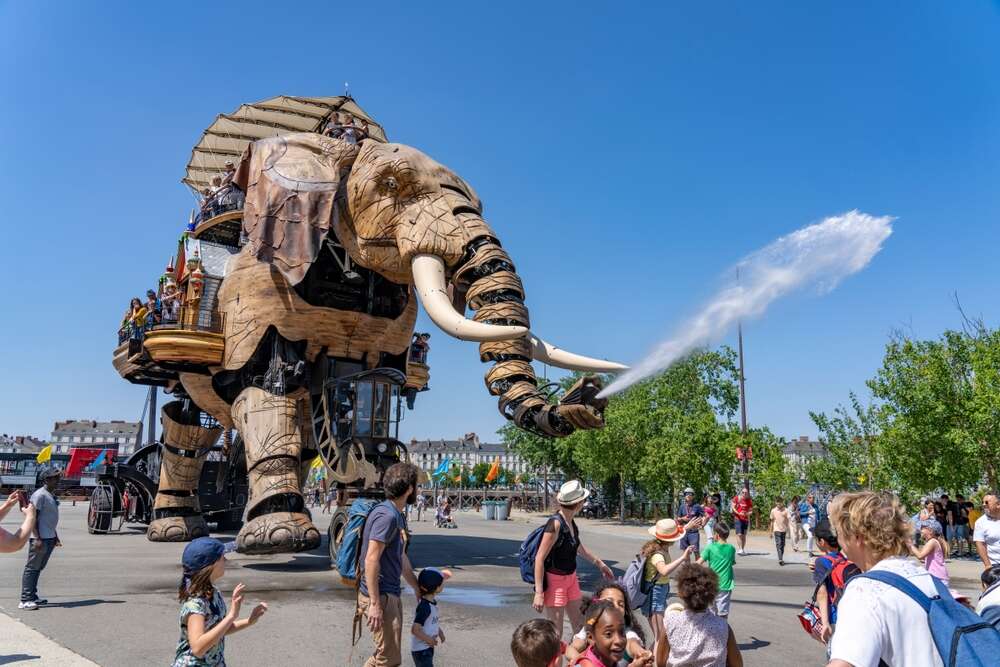
You might know that Nantes is a city in France, somewhere over there in the middle but towards the western coast; or that it is the title of a song by Beirut; or that it is occasionally good at football, but mostly just quite bad at football.

What you probably don’t know about Nantes is that it is the sixth biggest city in France, that it was in Brittany until it wasn’t, and that, depending on who you ask, it sort of is where May ’68 really started.
These things are not very important. There is only one thing you need to know about Nantes, and it is that Nantes is the best city in France – no, the best place in France. Nantes is better than Paris, it is better than those sunny bits down towards the south of France, it is better than anywhere in the country. Nantes is the best bit of France.
Why is that? It is hard to even know where to start. Nantes is the perfect size for a city – it is big enough that you do not feel suffocated by its three streets and seven shops, but it is also small enough that you can walk from any place in the centre of town to another in under half an hour.
If you do not want to walk, you can always take the bus, the tramway, or the BusWay, which is in many ways just a bus that happens to have its own separate lane but Nantes is credited with bringing the tramway back into fashion in Europe so we’re quite keen on keeping that going as a brand.
Still, taking a stroll through the centre of town probably remains your best option. From the sinking buildings of the Ile Feydeau to the grandeur of Place Mellinet, our old-timey – to use a technical term – architecture is something to behold.
(If for whatever reason contemporary architecture is more your thing, go check out the vile monstrosity that is the Palais de Justice, a large and menacing black rectangle along the river built in 2000. Each to their own.)
“Wow. Great,” I hear you say. “Streets and buildings. Two things I can definitely only find in Nantes.” That is a fair point. Nantes doesn’t only have streets and buildings. It is also pretty good at parks.
In fact, there are 100 public parks, gardens and squares in Nantes, covering 540 acres of land. It won the European Green Capital Award in 2013, and according to Wikipedia, the “European Commission noted the city’s efforts to reduce air pollution and CO2 emissions, its high-quality and well-managed public transport system and its biodiversity”, which is nice of them.
Anyway – parks and streets and buildings are nice but the best place in France they do not make. No, what makes Nantes great is its culture, which is odd, quirky and diverse and punches above its weight.
Take festivals. If there is a thing you enjoy in life, chances are that at some point during the year, Nantes will have a festival about it. Spanish cinema? Every April. Classical music? Every February. Jazz? Every summer. African, Asian and Latin American cinema? November. Flowers? May. Science fiction? Autumn. I could go on.
Beyond the festivals, Nantes is also home to (approximate figure) one million bars, cafes and slightly random places. The best one might well be the Lieu Unique, a former biscuit factory that is now home to Turkish baths, a book shop, a cafe, a restaurant, a bar, a club, an exhibition space and a gig venue.
Nantes unpacked
Does London have a place, former biscuit factory or not, that is home to Turkish baths, a book shop, a cafe, a restaurant, a bar, a club, an exhibition space and a gig venue? It does not.
Another highlight is the Machines de l’Ile. It is a bit hard to explain what goes on in there, but it is mostly large wooden things that move. In a good way.
You might have seen pictures of a 12m tall wooden elephant just casually walking around in a non-descript French city before. It is our elephant. It is massive and wooden and it moves. It’s great.
Royal De Luxe, the group behind the big, moving bits of wood, has been in Nantes for years and is generally up to something. A personal highlight was the time they collected broken grand pianos people didn’t want or need anymore and just chucked them off buildings to see what sound they’d make.
They made exactly the sound you’d think a grand piano would make when thrown off several storeys and onto the pavement, and it was excellent.
If all of this still has not convinced you that Nantes is the best place in France, it seems worth mentioning that we are the home of muscadet, the dry white wine that is weirdly only ever in fancy and expensive restaurants in the UK.
While it is true that there are a number of wine regions in France where you can get merrily sozzled on the local wine for €5 a bottle, muscadet is a very light wine, which means that it was essentially made to be drunk in large quantities. Can’t say that about a full-bodied Bordeaux, can you?
So, to recap: Nantes is a place that is big enough to be interesting but small enough that you can walk around it, it has both a tramway and a busway, which covers most types of ways, both its new and its old architecture are great, it has many parks, many things to do, good cheap white wine, and the ominous feeling that you might get flattened by a falling grand piano at any given time, like a dog who is also a bank robber in a children’s cartoon.
Nantes is the best place in France and the case is closed.






